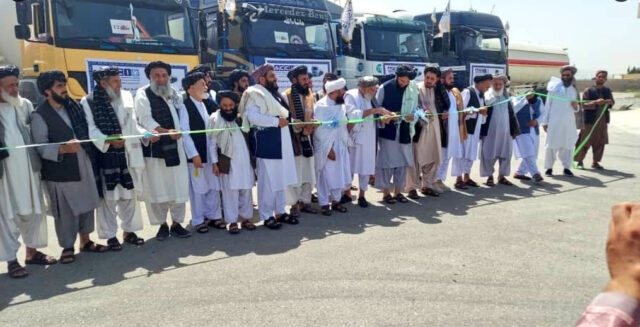Turkmenistan began supplying natural gas to Pakistan through Afghanistan

Turkmenistan accomplished the mission to export its natural gas to Pakistan through Afghanistan, an economic goal that Ashgabat aimed to reach to diversify its exports and trade partners and increase the revenue.
On April 29th, 2023, Turkmenistan started supplying natural gas to Pakistan through the territory of Afghanistan. The official opening ceremony of the transit route occurred on in Kandahar, TOLO News reported citing the Ministry of Finance of Afghanistan.
The Afghanistan Chamber of Commerce and Investment (ACCI) said that from now on, Turkmenistan will transport its natural gas to the border town of Towrgondi in Afghanistan and then exported to Pakistan via Spin Boldak in Kandahar. A private company undertakes transporting gas from Turkmenistan to Pakistan through Afghan territory.
In the first stage, Ashgabat sent 50 gas carriers from its territory to the Pakistani market. “This is a transit gas that is specially purchased for Pakistan and delivered to Pakistan, so its benefit for Afghanistan is that it requires transportation, and this creates jobs for people,” said Atikullah Saidal, head of the gas transportation company.
The ACCI said that Afghanistan plays an important role in connecting Central Asia with South Asia, and the current government should help traders in the transit of goods. Kandahar customs officials said they would give traders more options at customs, and officials said the border would soon be open 24/7 for the transit of commercial goods.
Turkmenistan and the TAPI project
Ashgabat has so far failed to implement the ambitious project to build the TAPI gas pipeline (Turkmenistan-Afghanistan-Pakistan-India) on the Afghan territory, although it agreed on the construction of the Afghan section both with the previous pro-American government in Kabul and the Taliban interim-government.
TAPI is a strategically important project for the Turkmen authorities. Back in 2010, Ashgabat hosted a summit of the heads of states participating in the project, who signed a framework agreement on the gas pipeline and an intergovernmental agreement on implementing TAPI. The gas pipeline should run from the Turkmen Galkynyş field in the Mary province, 150 km from the border of Afghanistan, through the Afghan provinces of Herat, Farah, Helmand and Kandahar and further to Pakistan and India. The project estimated annual volumes of deliveries through the TAPI pipeline at the level of up to 33 billion cubic meters of gas.
Despite their inability to ensure the safety of the construction, the Afghan government forces solemnly launched the construction of the Afghan section in 2018, but they had to freeze it. Over the past year, the Taliban have repeatedly promised to begin construction of the Afghan section of TAPI, but, according to the latest information, construction has not yet begun.
Why does it matter?
Turkmenistan is one of the largest producers of natural gas in the world, and Pakistan is a developing economy with a growing demand for energy. Exporting gas to Pakistan would allow Turkmenistan to expand its customer base and increase its revenue from gas exports. It could also provide Pakistan with a reliable source of energy that could help meet its growing energy needs.
Pakistan is currently heavily reliant on imported oil for its energy needs, and diversifying its sources of energy to include natural gas could help it reduce its reliance on oil and improve its energy security. The TAPI project would also create job opportunities and infrastructure development in the participating countries, providing a range of economic benefits.
Even though Ashgabat reached an important goal by exporting its natural gas to Pakistan through Afghanistan, there are still concerns about the security situation of the region. Indeed, local terrorist groups, in particular the Islamic State Vilayat Khorasan (ISKP) might exploit this trade activity to target strategic infrastructures.
